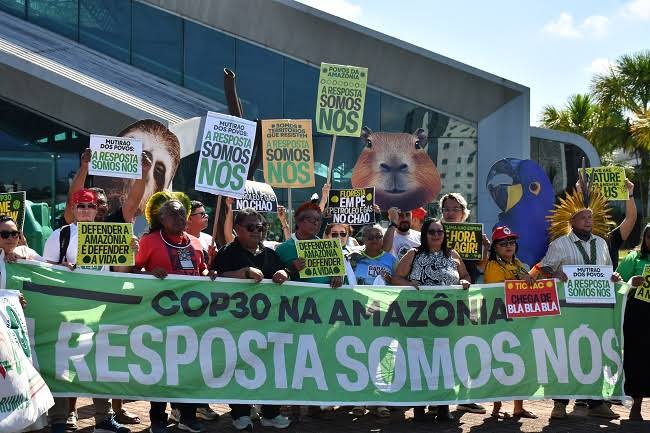Amazon’s Indigenous people stage protest at COP30 site in Brazil

By Abdullahi Lukman
Indigenous peoples, traditional communities, and social movements from across the Amazon staged a powerful demonstration on Wednesday at the construction site of COP30 in Belém, Brazil, calling on global leaders to recognize that the solutions to the climate crisis already exist—and are practiced daily by those living in harmony with the forest.
The protest, held in front of the future Blue Zone where the UN climate summit will take place, launched the *Declaration of the Amazon Peoples’ Gathering for COP30: The Answer is Us*, a collective political statement asserting that Indigenous knowledge and territory protection are central to solving the climate crisis.
At the heart of the demonstration stood a symbolic globe melting and stained with oil, representing the urgent threat posed by fossil fuels and environmental destruction.
Protesters held signs with messages such as “The Climate Won’t Wait,” “Keep the Forest Standing,” and “Leave Oil and Gas Underground.”
The declaration, backed by 19 organizations and the broader global climate movement, will be formally submitted to the COP30 Presidency.
It also ties into the global Draw The Line campaign, a week of action planned for September to demand immediate climate action.
The demonstration took place amid growing national tension in Brazil, where activists are urging President Lula to veto Bill 2159/21, dubbed the “Devastation Bill.”
Critics say the bill would dramatically weaken environmental protections, including removing the role of agencies like Funai from the licensing process—leaving Indigenous communities vulnerable to unchecked exploitation.
“For us, this bill undermines everything humanity is working toward in terms of sustainability,” said Kleber Karipuna, Executive Coordinator of the Articulation of Indigenous Peoples of Brazil (APIB).
Toya Manchineri, General Coordinator of COIAB, warned that the bill would strip Indigenous peoples of mechanisms to protect their lands and livelihoods.
Sila Mesquita Apurinã of the GTA Network emphasized that Indigenous peoples are already leading the way. “If world leaders don’t know what to do, we do,” she said. “Our ways of life are the solution.
That’s why we’re joining forces and reaffirming our fight for life.”
The declaration calls for full recognition and protection of Indigenous territories, an immediate end to destructive industrial activity, direct climate finance for forest and riverine communities, and the right to meaningful participation in all decision-making processes.
It frames the Amazon not only as a regional concern, but as a shared resource vital to all of humanity.
The demonstration signals a growing demand for climate justice, inclusion, and Indigenous leadership ahead of COP30, as the Amazon’s stewards assert their place at the center of the global climate conversation.
